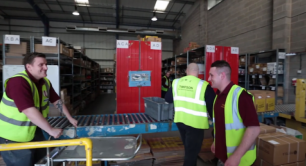Cordant chief: Why my £800m company is becoming a social enterprise
Recruitment giant the Cordant Group this week announced that it is transforming into the UK's biggest social enterprise. 'Chief energiser' Phillip Ullmann tells us why.
When we got notice that a company with revenues of £800m+ that has been operating successfully since 1959 is changing to become a social enterprise – the UK's biggest – our ears pricked up.
Given that things seemed to be ticking along quite nicely at the Cordant Group, with executive chairman Phillip Ullmann’s net worth running into the tens of millions (depending which website you read), the obvious question to ask is: why?
Ullmann is a little nervous in person, occasionally tripping over his words and with a slight tremble in his voice. But there can be no doubting the unshakeable views he holds about the ills of the world.
“Fundamentally, society isn’t working,” he starts.
“The state, democracy isn’t working.”
“Look at the social unrest there is in America, look at the massive changes that have happened over very short periods. There is instability. Look at the level of debt within the UK and America and the west. Nor is capitalism working. Look at the inequality we have.”
What follows is a lengthy diatribe that takes in the enlarged cost of outsourced foster care compared with the cost of a private education and also outrage at the distance that is put between families because it’s easiest to set up foster homes in areas where housing is cheap. He refers often to Social Enterprise UK CEO Peter Holbrook’s 2012 report on the shadow state.
“Now why has that happened?” he asks. “So Ullmann is determined that Cordant Group will become a social enterprise. Holbrook has been advising, as has Jim Clifford of Bates Wells Braithwaite, which will be assessing the social impact of Cordant over the next five years.
How will Cordant be a social enterprise? “It’s about relationships, it’s about delighting people rather than making money. That’s the simplest way that I can put it,” Ullmann says.
So far, in its transition to becoming a social enterprise, Cordant has changed its articles of association to include a series of social commitments, capped annual shareholder dividends and capped all executive salaries at £400,000 (20 times that of the lowest paid workers). There are also a number of plans afoot to fulfil its social mission.
After further discussion, “delighting people” seems to be the succinct, snappy (though less informative) shorthand he has settled on for what is really about helping people to reach their full potential.
He is clear about the three areas he wants to impact: healthcare, education and employment. This seems sensible given Cordant is the UK’s second largest recruiter: up to 125,000 people find employment through the organisation every year, which has 5,000 clients, predominantly in education, healthcare and IT.
He has plans to shake up the NHS by offering an IT system that Cordant has developed. The NHS has heard this before of course – much was made of the amount of money that was invested in such a scheme under PM Tony Blair. The plan was abandoned after more than £10bn was spent. More recently there have been concerns about the health system using an ancient version of Windows after a cyber attack.
Ullmann counters by explaining that the software he has in mind, Openair, will not be tied to one vendor to tailor it for use, which should mean companies aren’t tied to one vendor to keep their systems running smoothly. He's also aiming to cut out the (recruiting) middle man for the NHS, handed them a system where they can offer shifts directly to healthcare professionals.
The ultimate aim is more time helping patients and less time with process: “There are lives to be saved in healthcare by getting technology right,” he says.
Changing education
Ullmann has plenty more to say about education, about which he is scathing. “The school system has stagnated,” he says. “We are letting down loads and loads of kids. At the moment we are still lecturing. A lecture is not the ideal way to educate people; it’s still a one-way communication.”
Cordant has been working with education guru Richard Gerver. As the head teacher of the Grange school in Nuneaton, Gerver turned around a school that was failing and facing closure. Today, he's a speaker and adviser.
Gerver transformed the school by encouraging the kind of learning that kids do before they enter education, says Ullmann, where they learn through experience and enquiry. He also focused more on the impact of education on the children and less on government targets.
Ullmann describes it as “kids that are helping each other to be educated”. He went to Cambridge himself, but says “the quality of education was useless. The vast majority of lecturers were not inspirational.”
“I later did an Open University (OU) course and it was designed to educate me. It was designed to give me the knowledge I needed rather than for a lecturer to show me how clever he is.” He is further delighted when I point out the OU was created by celebrated social entrepreneur Michael Young.
With Gerver, Cordant is designing a programme it hopes will improve teacher and pupil engagement.
Changing the world of work
As a recruitment company, potentially the area he can have most social impact is in the area of work. His view is that 90% of people don’t enjoy the work they do and he wants to change that: “Our focus in our recruitment group will not be on making a profit but getting them into the right role to make a difference.”
His views on what might motivate low-paid workers, what might make their jobs meaningful, are perhaps more questionable: “If they’re a picker at Amazon and they are giving the end user what they need in an hour they can justify the fact that they are working hard because they are meeting the needs of another human being.”
We don’t want work to be monotonous and boring
Perhaps more easily understood are his views of empowering workers in other ways: “We don’t want work to be monotonous and boring and when workers have ideas, we want them to be able to express those ideas.”
He’s also expressed a desire for workers to be able to profit-share. It will be interesting to see the reaction of clients like Amazon and Tesco. Ullmann is optimistic: “This is an aim at present. We believe it will be infectious. Once one of these employers has done it, others will follow suit.”
In person, Ullmann comes across as either an idealist or a visionary, depending on your opinion of how likely he is to succeed with his goals, given the layers of bureaucracy and budget restrictions that will stand in his path.
He cites Frederic Laloux’s Reinventing Organizations throughout our conversation. Laloux is a former consultant at McKinsey who specialised in large-scale transformations. He spent three years researching organisations which have evolved from being controlled by a few people at the top to those that are largely self organised, with people contributing their whole selves, being very dedicated to their work.
Sorting out the finances
Cordant is owned by three branches of the Ullmann family and it took Phillip a year to convince the others that going down the social enterprise road was the right path.
The finance side is complex but, aside from a small number of people that have shares tied to the growth of the company, it is only the family that own shares. Dividends from the shares will be limited to £250,000, but Ullmann says that no dividends have been paid for the last few years in any case.
If dividends were to be taken, there would be a cap of £3m on everything due to each member of the family. “Thereafter everything after £3m – everything goes to society,” Ullmann says.
Although there are geographical differences (Cordant is a global company) there is an aspiration that no one at the company will be paid more than 20 times the lowest paid. Executive salaries will be capped at £400,000.
There will be some people who will not want to join the Cordant group because they will want to make money elsewhere
Ullmann realises this may impact on his own ability to hire the best: “There will be some people who will not want to join the Cordant Group because they will want to make money elsewhere.
“They won’t be for us in any case because we want people who buy into the vision. I want people to say “I’m happy with £400k here”. It’s more than anybody could possibly want in terms of lifestyle. What can’t you get? You get a very full life and the rest goes to society.”
So the social enterprise journey for Ullmann and Cordant starts here. Watch this space.



